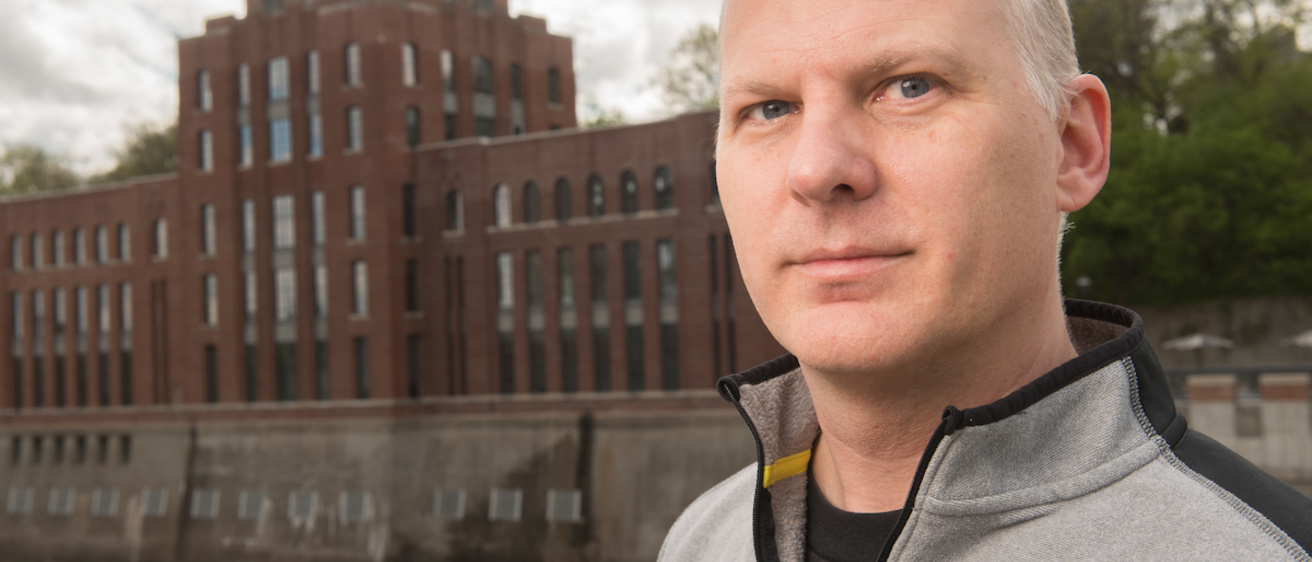After eight years of being a part-time and then full-time student, first at Kirkwood Community College and now at the University of Iowa, Sean Seelau finally will graduate at the age of 51 with a Bachelor of Arts in mechanical engineering—and he will be the first UI student to receive the new Certificate in Naval Hydrodynamics.
This BA will be in addition to one Seelau already earned in philosophy from Johns Hopkins University in 1988. In fact, Seelau also earned a master’s degree in philosophy from the UI in 1991 and spent more than a decade successfully pursuing a career in telecommunications.
Sean Seelau
Hometown: Cedar Rapids, Iowa
Area of study: Mechanical engineering
Graduation: May 2017
Plans after graduation: Being the first UI student to graduate with a Certificate in Naval Hydrodynamics, Seelau hopes to work with engineering firms that handle fluid dynamics.
He will be one of more than 4,800 UI students to graduate during spring commencement ceremonies May 11–14.
As for what drew him back to his education at the age of 43, Seelau says, “It wasn’t some big ‘a-ha’ moment exactly; it sort of crept up on me I guess. It circled me back around to my interest in science and physics from back in the day.”
Before philosophy, Seelau studied physics in college but didn’t want to pursue it as a career. Philosophy was interesting, he says, because of the analysis and logic it involved. The application of analysis and logic in solving complicated puzzles was a constant between the two fields, and after teaching for a few years in his 20s, the same thing drew him to telecommunications. His job there required him to troubleshoot and test a building’s computer systems; however, the work was not entirely satisfying.
“You’re spending the bulk of your life at work,” says Seelau, “and if it’s not the job that you want or if you see yourself doing something different, that’s a lot of time not doing what you really want to do, even though you may like it.”
Still drawn to solving puzzles, Seelau chose to study mechanical engineering, which blends the analysis and logic that drew him to philosophy with the real-world applications he encountered in his telecommunications work. Once enrolled in the UI College of Engineering, he became excited about the naval hydrodynamics certificate because of its more open-ended study of real-world engineering applications.
Certificate students learn methodologies for simulating and testing, among other things, the pressures a ship’s hull might encounter at sea. Seelau says the laboratory technology that students can access is surprisingly cutting edge. IIHR–Hydroscience and Engineering, formerly known as the Iowa Institute for Hydraulic Research, has been gathering experimental data for 50 years and has the most advanced computer code in the world for simulating water flow around a ship.
In fact, the U.S. Navy uses the IIHR’s data and advanced computer code to test their ship designs. U.S. Navy engineers also visit classes as part of the certificate to discuss the challenges they face in building the next generation of the U.S. fleet.
None of it was top secret, Seelau is quick to add, but he appreciated the exposure to puzzles being solved in the real world.
As part of the certificate, Seelau and a team of students are completing a year-long project in which they design the hull and propulsion system of a robotic boat. Though they won’t actually build the boat, Seelau says their design will help the Iowa Marine Autonomous Racing Club (IMARC) in their bid to win the 2017 RoboBoat competition taking place this summer.
Seelau and his wife both have countdown timers on their smartphones reporting the number of days until graduation. He does not have a job lined up yet and says—as the father of two active children—he hasn’t even had time to look for one.
He says he will miss being around people as interested as he is in learning new things, though he is looking forward to the prospect of a 40-hour work week, which, after seven years of balancing work, family, and academics, will feel like a vacation.
“I’d like to spend more time with my family,” he says, “but I’m also really excited to actually use these skills in some kind of real-world way. After all this time, here’s the job I’m meant to do. I’ve got these skills—let’s do something with them.”
